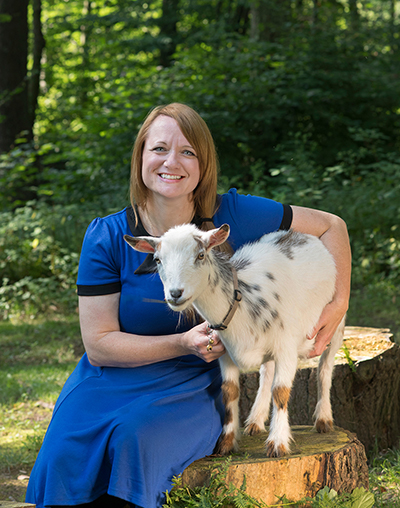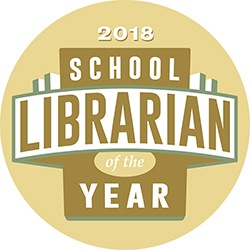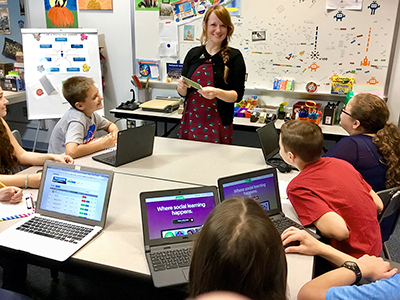Appalachian Trailblazer: Ali Schilpp, SLJ's 2018 School Librarian of the Year
Ali Schilpp brings big ideas to a small school in Accident, MD.
 |
Ali Schilpp, SLJ's 2018
|
Ali Schilpp was seeking a slower pace of life when she moved to the tiny Appalachian town of Accident, Maryland—a mountain community of farms and ski resorts three hours west of Baltimore. But she didn’t want to completely leave the big city behind. Her vision was to bring a world-class education to the 351 students at Northern Middle School (NMS), and that is just what she has done in the four years she has been there.
“My goal was to provide the students here in Accident with the same opportunities that I had in Baltimore County,” Schilpp says. The first library media specialist at NMS, she had previously worked for 12 years as the librarian of a STEM magnet school in the suburbs of Baltimore, 175 miles from Accident. Whether urban or rural, and regardless of family income, students are not that different, she believes.
“I wanted them to know they can compete on the same level as any student from a big district.”
“The experience of creating a program on a blank canvas, in a remote area, has been life-changing,” Schilpp adds.
Related ArticlesBay Bridge Builder:
|
It has changed the lives of her students as well. While Schilpp may have been seeking a simpler life, she hasn’t left her metropolitan attitude behind. The librarian wanted to share big-city experiences with this rural school. “There’s no reason that I can’t, especially with technology,” she says. Now, NMS has expanded robotics and technology. Using the Internet, the librarian has connected her students with accomplished authors, schools from other countries, and other new experiences.
Starting from scratch
A moment of serendipity led Schilpp to Accident. She was attending a Blue Ribbon awards banquet honoring schools for high performance or strides in closing the achievement gap, with her husband, Brian, also an educator. He was so impressed by the presentation for Northern Garrett High School in Accident that he joked with the county public schools superintendent at the next table, “Do you have any jobs?”
It turned out that the district had an opening for a school librarian. She started in the fall of 2014. Before she arrived, the school only had a clerk who shelved books. “The kids were in there just silently reading,” she recalls. Instead of being discouraged, Schilpp saw unlimited possibilities for the 4,400-square-foot library. “Mrs. Schilpp is a transformational leader in our school, county, and state,” says NMS principal David Yoder.
At a school where 50 percent of the students qualify for free or reduced-price lunch, Schilpp has an annual library budget averaging under $3,000. That didn’t scare the librarian, who had previously worked at a Title I school in Baltimore. She helps ensure students get what they need by finding extra funding. “I learned how to write grants and connect to the community, which was very generous.” She received a $10,000 digital learning grant from the state of Maryland, which purchased 30 Chromebooks, 35 iPads, and helped build a makerspace—including green screens and 14 LEGO Mindstorms EV3 robotics sets. In 2016, she applied for a Patterson Pledge Grant, from the novelist James Patterson in partnership with Scholastic. Drawing inspiration from House of Robots, a middle grade book cowritten by Patterson and Chris Grabenstein, Schilpp’s grant application requested funds to bring more robotics to the school. That winning application netted $4,500, which Schilpp used to buy class sets of The Crossover by Kwame Alexander and Long Way Down by Jason Reynolds, plus more tech and robotics parts by Ozobots, Sphero, Cozmo, Parrot Drones, Bloxels, AR Merge Cubes, MakeyMakey, and Raspberry Pi.
Tech engagement, global connections
Schilpp works closely with NMS robotics teacher Chuck Trautwein, whose classroom is right next to the library. Under Trautwein’s mentorship, she coaches the school’s First LEGO League (FLL) team. Schilpp’s son Abe, a seventh grader at NMS, taught her how to use Tinkercad and Scratch and helps troubleshoot the 3-D printer and EV3 robots. The robotics program is truly a family affair, as Schilpp’s husband, now a science teacher at the school, also helps program the EV3 units.
In addition to the extracurricular FLL team, every NMS sixth grader participates in an abbreviated version of the challenge. Last year’s theme was hydrodynamics. After visiting a waste water treatment plant and learning that 90 percent of the budget went toward masking noxious smells, the students embarked on a potential solution that involved growing lavender plants in the school library. In all, students tended more than 60 pots of the herb, taking them home at the end of the project.
In another challenge, the students were tasked with using technology to help animals. One student came up with a plan to use 3-D printers to make flea combs for dogs. Another hatched a scheme to create a music player for injured birds of prey that were recovering at a local aviary.
 Schilpp also coaches an all-girls FIRST Tech Challenge (FTC) team of eighth graders, which went all the way to the state championships. The school has an all-boys FTC team as well.
Schilpp also coaches an all-girls FIRST Tech Challenge (FTC) team of eighth graders, which went all the way to the state championships. The school has an all-boys FTC team as well.
Schilpp has brought a global perspective to her rural students. Using technology such as Skype or Flipgrid, her kids connect with children and educators in Hawaii, Australia, England, and China. When students were having a hard time engaging with a geography lesson, Schilpp collaborated with NMS sixth grade teachers Angie Rush and Lisa Carr to add a real-world element. Using Flipgrid, the classes connect with students of fellow librarians Schilpp met on Twitter. They nicknamed this digital citizenship experience “What in the WORLD are we reading?” Through this, Schilpp models positive online interactions, and students from different parts of the world present about their hometowns and favorite reads.
“Our students shared their favorite books and facts about their home city of London, and Ali’s class told us about their favorite books and their home state and town,” explains Lucas Maxwell, librarian at the Glenthorne High School, south of London, who collaborated with Schilpp. The Maryland students received computer-printed postcards and a LEGO minifigure from their British peers. That inspired a broader exchange that included a high school in Australia and classrooms in Hawaii and China. The LEGO “travel buddies” have been sent to many partner schools; students take pictures and videos of the minifigures in different places, including flying on a drone over a volcano in Hawaii, which they share over social media. Schilpp compares it to “a modern Flat Stanley.”
Schilpp has brought many authors to Accident, in person and virtually. Because of the school’s remote location, writers often speak with the kids via Skype, which has the added benefit of saving on speaking fees. Students have videoconferenced with Margaret Peterson Haddix, Kwame Alexander, Gennifer Choldenko, and Debbie Levy. Schilpp stays in regular communication with Grabenstein, who happens to have family in nearby Cumberland. The author even named a character Dean Schilpp in the second book of his “House of Robots” series, Robots Go Wild. “This is probably the best honor any librarian can receive, to appear in a book that your students love to read!” Schilpp says. Her older son, Elliott, who graduated from NMS, also has a character named after him in Grabenstein’s “Mr. Lemoncello’s Library” series.
Prompted by last year’s First LEGO League animal-themed challenge, Schilpp reached out to a therapy dog trainer with a local chapter of the organization Paws to Read. Killian, a six-year-old Irish wolfhound, visits the NMS library every Thursday. “He’s huge!” Schilpp says. “Instantly it’s a stress reliever when you see him. He will lie down with the kids, let them read to him.” The library now even includes a reading nook, where kids can snuggle with their four-legged friend.
Platforms for newscasting, writing, and more
 |
Schilpp and students at the
|
Other programs Schilpp has initiated include a daily school newscast, a YouTube channel, a Harry Potter club, a schoolwide poet-tree (a LED tree decorated with poems written by students), and a writer’s workshop. Through the workshop, students write essays about a book that has impacted them for the annual Maryland Humanities Council’s Letters About Literature contest. In 2016, sixth grader Jaquelyn Jacobs wrote about how the young adult novel The Book Thief by Markus Zusak taught her how to be a better friend. She was a finalist for her grade level that year. “Before she left eighth grade, she wrote a letter thanking me for that opportunity and how the library was a safe place,” recalls Schilpp. Four other NMS students have since been honored in state competition. Another eighth grader’s report on the 1923 Rosewood Massacre won a Scholastic Gold Key award for journalism.
Frequently sharing her knowledge with her peers, Schilpp has presented twice at the Maryland Association of School Librarians. She received a professional learning grant to attend ISTE, among other conferences, and can be heard on an Edumatch podcast discussing the importance of collaboration, exemplified by her students with the 90-Second Newbery Film Festival and National History Day.
Thanks to Schilpp’s efforts, the NMS library now holds 8,700 books. In addition to grants, Schilpp raises an average $2,000 annually through Scholastic book fairs. Still, the collection is more homegrown than is likely to be found at bigger libraries. “I used to be very self-conscious about books in the library, because they’re not library bound,” she says. “Some of the books the kids have in their hand might be my personal copy. Sometimes that creates a more personal relationship, because they know they have to return it to me.”
Those books are just the start, as the power of a librarian goes beyond the physical collection or gadgets within the four walls. “The physical space has been transformed into an area that is so incredibly inviting, innovative, intriguing, and stimulating to students and staff members,” says Yoder.
The students have had a hand in that: They helped build library bookshelves, tables, puppet stands, and displays. “It gives them great pride every time they come to the library, and they often exclaim, ‘I made that!’” Schilpp says. All these things fit together in her scheme to inspire kids with a love of learning. In order to teach students how to have the growth mind-set that is so sought after in today’s world, she models it herself. “I am inspired and learn from my students daily about robotics and farming,” she says, adding that she now raises dwarf goats at her own family farm. “My only regret is that I didn’t get here sooner!”
Grace Hwang Lynch, a Bay Area freelance writer, blogs at HapaMama.com.
RELATED
The job outlook in 2030: Librarians will be in demand
The job outlook in 2030: Librarians will be in demand
ALREADY A SUBSCRIBER? LOG IN
We are currently offering this content for free. Sign up now to activate your personal profile, where you can save articles for future viewing






Add Comment :-
Be the first reader to comment.
Comment Policy:
Comment should not be empty !!!